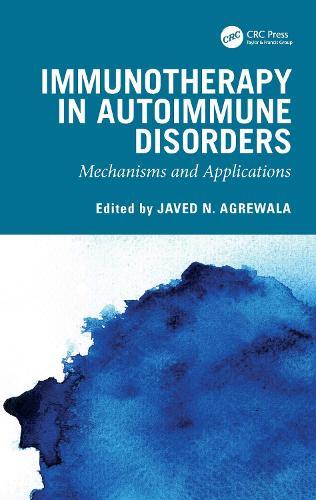Full Product Details
Author: Javed Naim Agrewala
Publisher: Taylor & Francis Ltd
Imprint: CRC Press
Weight: 0.600kg
ISBN: 9781032851952
ISBN 10: 1032851953
Pages: 228
Publication Date: 14 September 2025
Audience:
College/higher education
,
Professional and scholarly
,
Tertiary & Higher Education
,
Professional & Vocational
Format: Hardback
Publisher's Status: Active
Availability: Not yet available

This item is yet to be released. You can pre-order this item and we will dispatch it to you upon its release.
Author Information
Javed N. Agrewala (born 14 May 1961) is an Indian immunologist, a Professor at the Indian Institute of Technology Ropar, and former Chief Scientist and Professor at the Institute of Microbial Technology, Chandigarh, known for his immunology research. Dr. Agrewala is an elected fellow of all the three major Indian science academies, viz. National Academy of Sciences, India, Indian National Science Academy, and Academy of Sciences. The Council of Scientific and Industrial Research, the apex agency of the Government of India for scientific research, awarded him the Shanti Swarup Bhatnagar Prize for Science and Technology, one of the highest Indian science awards, for his contributions to Medical Sciences in 2005. He has also received the National Bioscience Award for Career Development from the Department of Biotechnology. Dr. Agrewala’s group has pioneered research in the area of costimulatory molecules and pathogen regulated receptors–mediated regulation of the immune system (J Immunol. 1994; Eur J Immunol. 1994; J Immunol. 1998; J Biol Chem. 2002; J Biol. Chem. 2007; Immunol Rev. 2006; J Infect Dis. 2015; Sci Rep. 2015a, 2015b, Front Immunol. 2016, 2017, 2018). His original discoveries relate to understanding the role of costimulatory molecules in suppressing the growth of B cell lymphomas, which was a revelation in the field of cancer. This study encouraged Biogene Pharma Company to develop therapeutic antibodies against CD80 to treat patients suffering from refractory and relapsed follicular lymphomas (J Clin Oncol. 2005). His group has made seminal contributions in the area of novel vaccination strategies against M. tuberculosis (J Infect Dis. 2004, 2010, 2011, 2014, 2015; J Proteome Res. 2008, Trends Mol Medicine 2012; Crit Rev Microbiol. 2011, 2015, 2017, Sci Rep. 2016; Front Microbiol. 2015; Clin Exp Immunol. 2015; J Transl Med 2017; USA Patent 2004, 2016). Recently, his group has engineered a chimeric vaccine with the help of Prof. David C. Jackson, Melbourne University, Australia, comprising a promiscuous peptide of Mycobacterium tuberculosis (Mtb) and a TLR-2 agonist Pam2Cys. The construct induces enduring memory T cell response and imparts better protection than BCG. The group has initiated a collaborative study with Prof Kim Janda, Scripps Research Institute, La Jolla, USA, to develop vaccines against narcotics. His group explores environmental and gut microbes for human welfare. In this connection, they have discovered a novel role of Caerulomycin A (secreted by actinomycetes) as an immunosuppressive agent by restraining the activation of T cells and increasing the survival of allogeneic skin grafts and alleviating the symptoms associated with autoimmune diseases (United States Patent No. 8,114,895: 2012; Autoimmunity 2017; Sci Rep. 2015; J Biol Chem. 2014; PloS One 2014; Transplantation 2014). The group has in-depth elucidated the mechanism of action involved in the immunosuppression and suggested that Caerulomycin A enhances TGF-β-Smad3 protein signaling by suppressing IFN-γ signal transducer and activating transcription 1 protein signaling to expand Treg. Importantly, this immunosuppressive molecule’s technology has been developed and licensed to Nostrum Pharma, USA, for US$3 million. Further, the group has observed that gut microbes can contribute to preventing tuberculosis (Crit Rev Microbiol. 2014, Front Immunol. 2017).



